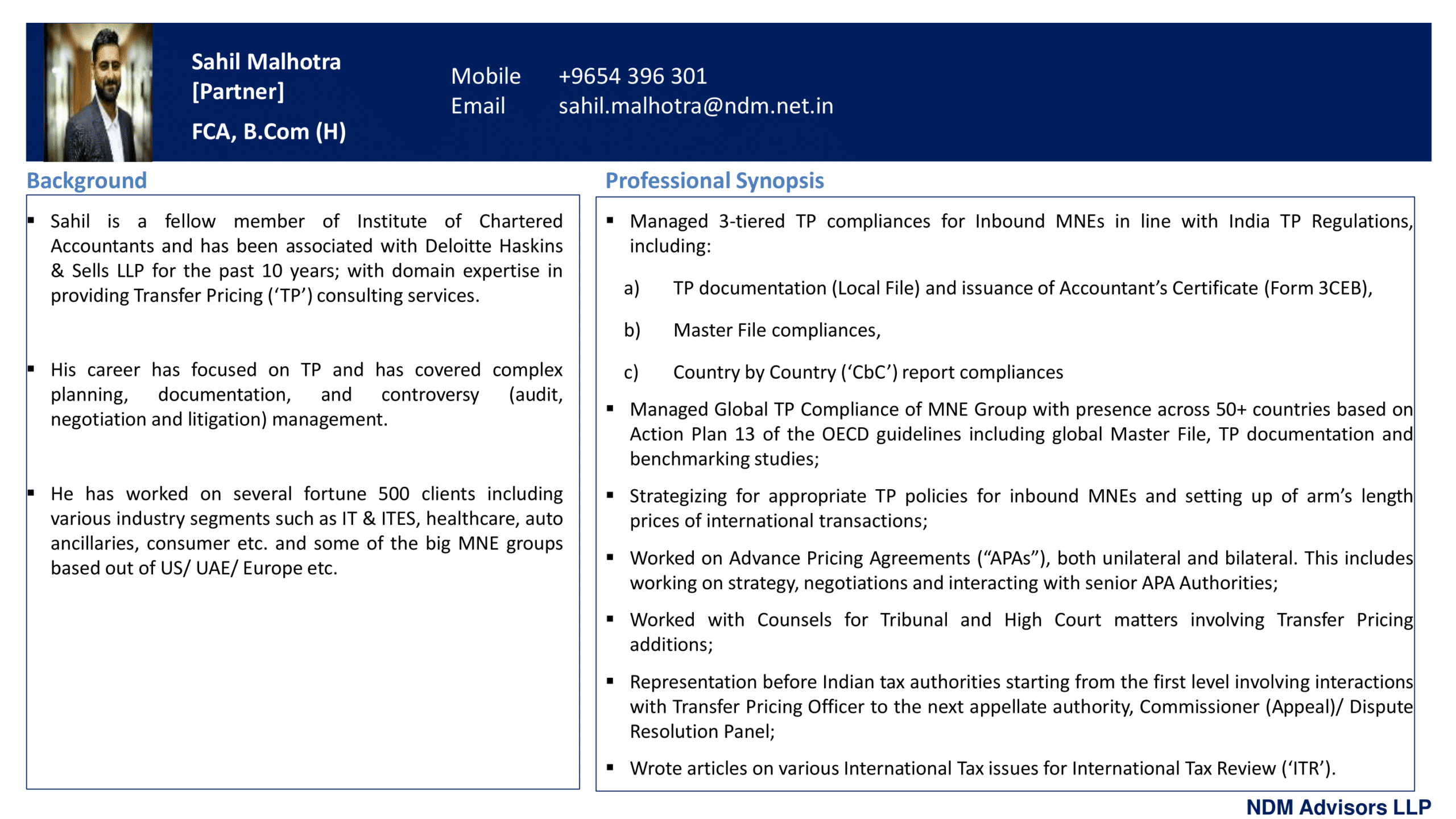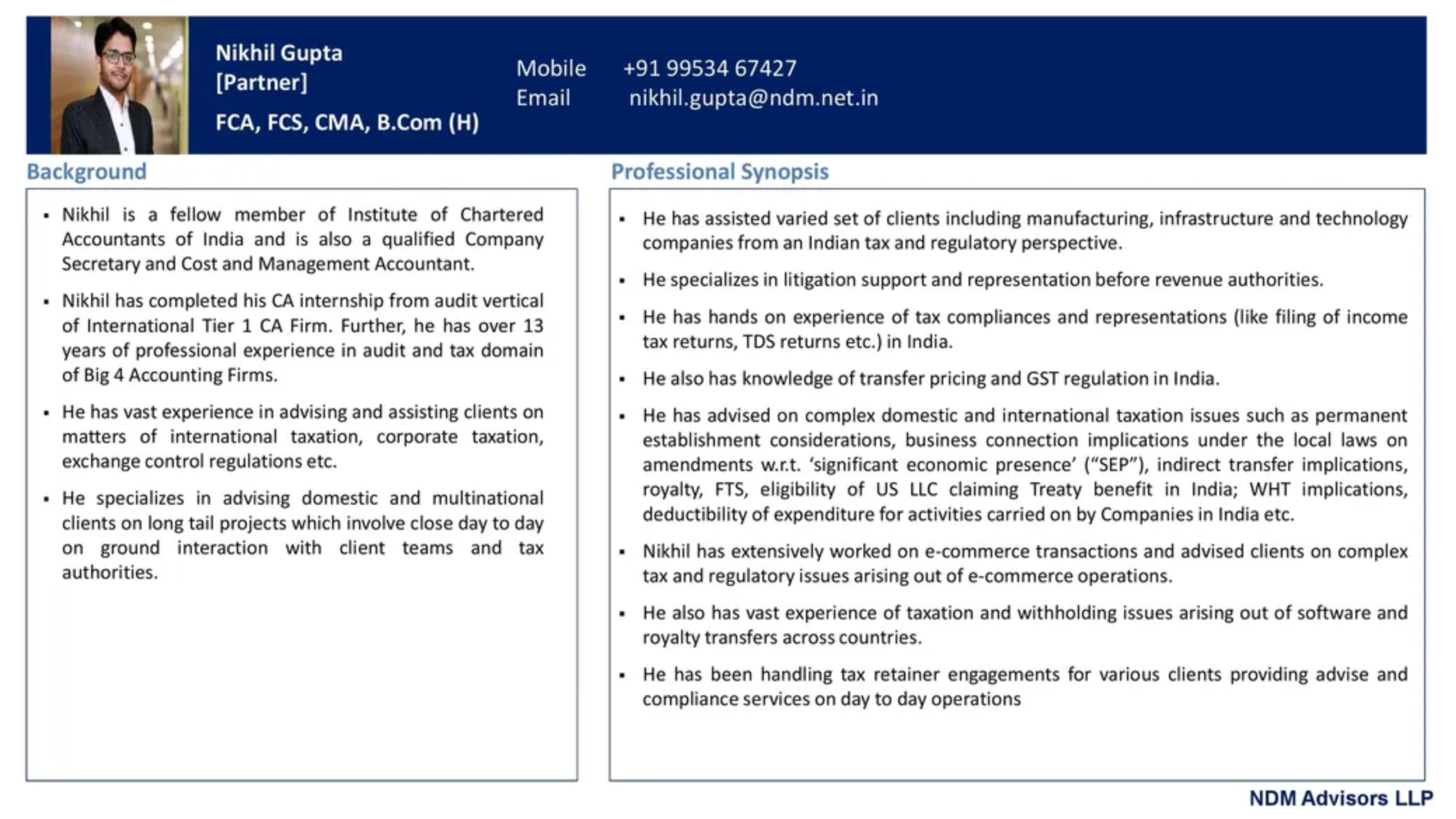Permanent Establishment

The words ‘permanent establishment’ postulate the existence of a substantial element of an enduring or permanent nature of a foreign enterprise in another country which can be attributed to a fixed placed of business in that country. It should be such as that it would amount to a virtual projection of the foreign enterprise of one country into the soil of another country.”
Permanent Establishment under Income-tax Act
- The concept of PE was introduced in the Act as part of the statutory provisions of transfer pricing by the Finance Act, 2001
- Circular No. 14 of 2001 ([2001] 252 ITR (St.) 65, 107) clarified that the term PE has not been defined in the Act but its meaning may be understood with reference to the tax treaty entered into by India.
- However, vide Finance Act, 2002, the definition of PE was inserted in the Act under section 92F(iiia) which states that the PE includes a fixed place of business through which the business of the enterprise is wholly or partly carried on.
- Morgan Stanley [2007] 292 ITR 416 (SC) – Supreme Court observed that the PE is an inclusive definition covers service PE, agency PE, construction PE, etc.

PE An Overview
The concept of a PE is also defined in the Double Tax Avoidance Agreement between countries and Income Tax Act 1961. A foreign enterprise would be considered as a Permanent Establishment in India (as per Article 5 of Income Tax Treaty of India and foreign countries) if it has a fixed place of business in India or carrying out a business in India through:
- a place of management, branch, office, factory, workshop, warehouse etc. or
- a building site or construction, installation or assembly project or supervisory activities in connection therewith where such site, project or activities continue for a specified period, or
- furnish service for a specified period, or
- an agent (other than an independent agent) who habitually exercise an authority to conclude contracts or regularly deliver goods or merchandise or habitually secure orders on behalf of the foreign company.
In case a foreign enterprise is considered to have a Permanent Establishment in India, the business income of such foreign enterprise attributable to the business carried out in India will be taxable in India under Article 7 of the Income Tax Treaty between India & foreign country and would require to carry out all the compliances (such as filing of tax return etc.) as per Income Tax Act 1961 in India.
Permanent establishment (PE) was thus formulated to levy taxes on the income generated. There are two major grounds for Permanent Establishment taxation –
Residential taxation – The permanent establishment rule under residential taxation says that if an individual in India is earning revenues by carrying out business activities globally, they are liable to pay taxes under residential taxes.
Sourced Taxation – The permanent establishment rule under sourced taxation mentions that if a foreign business or entity is partially or wholly operating any economic activities in India to generate income, they are bound to pay taxes under sourced taxation.

Following are the main categories under which a foreign enterprise would be considered as a Permanent Establishment in India:
- Fixed Permanent Establishment
- Agency Permanent Establishment
- Service Permanent Establishment
Fixed Permanent Establishment (Fixed PE):
An Indian subsidiary company can be considered as a Permanent Establishment of foreign enterprise under the fixed place clause of Article 5(1) of the Income Tax Treaty between India and foreign countries. Following are the two conditions under which a foreign enterprise would be considered as Fixed PE in India:
- Foreign enterprise has a Fixed Place of Business in India;
- Business of the foreign enterprise is wholly or partly carried on.
Any space or premises belonging to the Indian subsidiary at the disposal of a foreign enterprises as a matter of right can meet the requirement of Article 5(1) i.e., a fixed place through which the business is carried on.
Agency Permanent Establishment (Agency PE):
An Indian subsidiary company can be considered as a Permanent Establishment of a foreign enterprise under the agency clause of Article 5(4) of the Income Tax Treaty between India and foreign country. The agency clause of Permanent Establishment is attracted if the agent appointed by the foreign enterprise in India is dependent. The agent who is dependent and performs the following functions will be considered as a PE of the foreign enterprise:
- Exercises an authority to conclude contracts on behalf of the foreign enterprise.
- Secures orders wholly or almost wholly for the foreign enterprise.
- Maintains the stock of goods or merchandise from which the agent regularly delivers on behalf of the foreign enterprise.
The following three requisites are necessary for establishing an agent as an independent agent:
- He should be acting in the ordinary course of his business;
- His activities should not be devoted wholly or almost wholly on behalf of the foreign enterprise for whom he is acting as an agent;
- The transactions between the foreign enterprise and the agent should be at arm’s length.

Service Permanent Establishment (Service PE):
Service PE is attracted by a foreign enterprise in India if its employees furnish or perform services in India exceeding the specified period. If the employees of a foreign enterprise are working in India for a period more than what is specified and the employment agreement in the name of foreign enterprise establishes that the enterprise, through its employees, provides a service to the customers in India, the enterprise constitutes a Service PE in India.
Major Concerns with PE establishment in India
There are various concerns that business entities have to contemplate upon before the establishment of PE in India –
- After establishing a PE in India, the company is liable to pay taxes according to the revenue generation and profit acquisition. Article 7 of the Tax Treaty terms permanent establishment taxation as the ‘business income’ of the country.
- The profit margins of foreign enterprises reduce in permanent establishment comparatively from independent operations. The enterprise has to mandatorily maintain books of accounts and records.
- The foreign enterprise will have to register themselves for PAN card, TAN, and other Indirect Taxes
- The Net Profit of the foreign enterprises operating in India is liable for taxation under permanent establishment. The Net Profit also excludes the tax-deductible expenses.
- The foreign enterprise will also have to take care of the Retention Tax popularly known as Withholding Tax (WHT)
Conclusion:
Any space or premises belonging to an Indian subsidiary at the disposal of the foreign enterprises or employees of foreign enterprise as a matter of right can be considered as the Permanent Establishment of a foreign enterprise in India.
The transactions between foreign enterprise and Indian subsidiary are on a principal-to-principal basis & at arm’s length. The subsidiary company functions & carries on its business instead of functioning as an agent of the foreign enterprise, the mere fact that the company is a subsidiary of the foreign company is not a valid ground for holding it to be a Permanent Establishment. However, in case the Indian subsidiary functioning as a dependent agent, it can be considered as a Permanent Establishment of the foreign enterprise in India.
If the employees of a foreign enterprise furnish or perform services in India exceeding the specified period, they are considered as a Permanent Establishment of the foreign enterprise in India.
Have Any Question?
Send us a message and tell us more about your business and financial goals. We will get back to you soon to schedule a consultation.
- +91 9873210394
- Communications@ndm.net.in


















